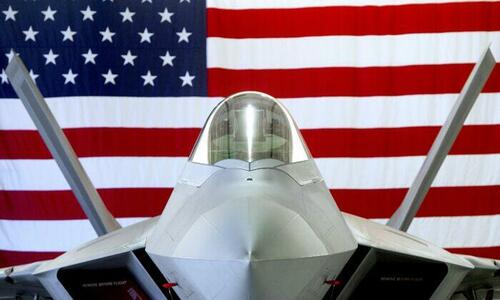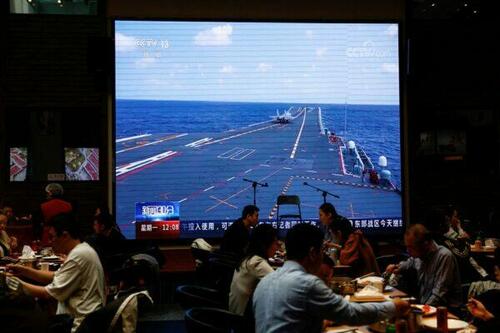
Authored by Andrew Thornebrooke via The Epoch Times (emphasis ours),
The ammunition is running low, casualties are immense, medicine and other critical supplies have not come for weeks, and a nuclear attack on the American homeland is imminent.

It is a dramatic scene, more closely resembling a Hollywood drama than any war that the United States has actually fought in the last half-century. It is nevertheless what many expect a war between the United States and communist China could look like this decade.
Both the United States and China are investing record-breaking sums in building up their military capabilities. Leadership on both sides increasingly appears to consider such a conflict as inevitable, despite rhetoric to the contrary.
The cause for that mutual enmity is the Chinese Communist Party’s (CCP) claim that democratic Taiwan belongs to China, and CCP leader Xi Jinping’s desire to force that unification within a few years’ time.
Xi has ordered the regime’s military wing to prepare for war, and to be ready to launch an invasion of Taiwan by 2027.
Preparing for what would be history’s most ambitious amphibious assault is not the same as actually launching it. But, should the worst occur, the Biden administration or its successor will have to decide either to join the fray, or to let Taiwan stand on its own and fight for its freedom.
Before U.S. leadership decides on that question, however, it must answer another, more foundational one: Can the United States win a war with China

‘The Window of Maximum Danger’
Rep. Mike Gallagher (R-Wisc.) is more invested in the new cold war between the United States and China than most.
Tasked with leading Congress’ new House Select Committee on Strategic Competition with the CCP, he is one of the few movers and shakers in the legislative branch directly engaged in developing an action plan to defend the American people, its economy, and values from CCP aggression.
For him, Russia’s ongoing conquest of Ukraine, and the United States’ failure to deter it, contain all the lessons necessary to prepare for what comes next in Taiwan.
“If we don’t learn the right lessons from the failure of deterrence in Ukraine, authoritarian aggression and the CCP’s malign influence will spread to the Indo-Pacific, and our New Cold War with the Chinese Communist Party could quickly become hot,” Gallagher told The Epoch Times.
“To prevent this, we have to act with a sense of urgency and do everything we can to deter a CCP invasion of Taiwan.”

That plan is much the same as it has been since 1979, when the United States passed the Taiwan Relations Act and agreed to provide the island with the arms necessary to maintain its self-defense.
The strategic landscape 44 years ago was something altogether different, however, and the number of weapons and systems that Taiwan now requires to hold the CCP at threat are immense.
The way Gallagher sees it, neither Taiwan nor the United States is prepared for the possibility of war with China.
Speaking back in November of 2021, Gallagher warned that, “if we went to war in the Taiwan Strait tomorrow, we’d probably lose.”
Gallagher is careful now to avoid similar doomspeak but, when asked if he still agreed with that assessment, his optimism for the United States’ performance in a war with China is palpably limited.
“If the Chinese Communist Party invaded Taiwan today, we would not be well positioned to defend our friend, our interests, or American values in the Indo-Pacific,” Gallagher says.
The United States must choose, he believes, to arm Taiwan to the teeth now or come to Taiwan’s aid at a much greater cost later.
Either way, the choices the United States makes now, he says, will largely determine the conditions of victory and defeat at a later date. To that end, Congress must unite to arm Taiwan and systematically counter the CCP’s malign influence at every opportunity.
“We are in the window of maximum danger,” Gallagher says, “and if we are going to ensure that it’s the U.S.—not the CCP—writing the rules of the 21st century, we need to unite in overwhelming bipartisan fashion to combat CCP aggression.”
Read more here...
Authored by Andrew Thornebrooke via The Epoch Times (emphasis ours),
The ammunition is running low, casualties are immense, medicine and other critical supplies have not come for weeks, and a nuclear attack on the American homeland is imminent.

It is a dramatic scene, more closely resembling a Hollywood drama than any war that the United States has actually fought in the last half-century. It is nevertheless what many expect a war between the United States and communist China could look like this decade.
Both the United States and China are investing record-breaking sums in building up their military capabilities. Leadership on both sides increasingly appears to consider such a conflict as inevitable, despite rhetoric to the contrary.
The cause for that mutual enmity is the Chinese Communist Party’s (CCP) claim that democratic Taiwan belongs to China, and CCP leader Xi Jinping’s desire to force that unification within a few years’ time.
Xi has ordered the regime’s military wing to prepare for war, and to be ready to launch an invasion of Taiwan by 2027.
Preparing for what would be history’s most ambitious amphibious assault is not the same as actually launching it. But, should the worst occur, the Biden administration or its successor will have to decide either to join the fray, or to let Taiwan stand on its own and fight for its freedom.
Before U.S. leadership decides on that question, however, it must answer another, more foundational one: Can the United States win a war with China?

‘The Window of Maximum Danger’
Rep. Mike Gallagher (R-Wisc.) is more invested in the new cold war between the United States and China than most.
Tasked with leading Congress’ new House Select Committee on Strategic Competition with the CCP, he is one of the few movers and shakers in the legislative branch directly engaged in developing an action plan to defend the American people, its economy, and values from CCP aggression.
For him, Russia’s ongoing conquest of Ukraine, and the United States’ failure to deter it, contain all the lessons necessary to prepare for what comes next in Taiwan.
“If we don’t learn the right lessons from the failure of deterrence in Ukraine, authoritarian aggression and the CCP’s malign influence will spread to the Indo-Pacific, and our New Cold War with the Chinese Communist Party could quickly become hot,” Gallagher told The Epoch Times.
“To prevent this, we have to act with a sense of urgency and do everything we can to deter a CCP invasion of Taiwan.”

That plan is much the same as it has been since 1979, when the United States passed the Taiwan Relations Act and agreed to provide the island with the arms necessary to maintain its self-defense.
The strategic landscape 44 years ago was something altogether different, however, and the number of weapons and systems that Taiwan now requires to hold the CCP at threat are immense.
The way Gallagher sees it, neither Taiwan nor the United States is prepared for the possibility of war with China.
Speaking back in November of 2021, Gallagher warned that, “if we went to war in the Taiwan Strait tomorrow, we’d probably lose.”
Gallagher is careful now to avoid similar doomspeak but, when asked if he still agreed with that assessment, his optimism for the United States’ performance in a war with China is palpably limited.
“If the Chinese Communist Party invaded Taiwan today, we would not be well positioned to defend our friend, our interests, or American values in the Indo-Pacific,” Gallagher says.
The United States must choose, he believes, to arm Taiwan to the teeth now or come to Taiwan’s aid at a much greater cost later.
Either way, the choices the United States makes now, he says, will largely determine the conditions of victory and defeat at a later date. To that end, Congress must unite to arm Taiwan and systematically counter the CCP’s malign influence at every opportunity.
“We are in the window of maximum danger,” Gallagher says, “and if we are going to ensure that it’s the U.S.—not the CCP—writing the rules of the 21st century, we need to unite in overwhelming bipartisan fashion to combat CCP aggression.”
Read more here…
Loading…





